Environment, Forest, and Climate Change Adviser Syeda Rizwana Hasan emphasized the need for a national consensus to drive meaningful reforms, highlighting unity as a cornerstone for addressing critical national issues.
Speaking at the inaugural session of the National Dialogue 2024 titled "Which Path to Unity" at the Krishibid Institution Auditorium in Dhaka on Friday, Rizwana stressed that reforms must be inclusive, considering communal harmony, political stability, and the aspirations of the younger generation.
"Compromises may be necessary, but public participation is essential for building consensus," she remarked, urging collaborative efforts rather than adversarial approaches in reform discussions.
Rizwana outlined the importance of addressing key questions about reforms, including their scope, implementation, and timelines, while emphasizing that stepping back from reform initiatives would only exacerbate political instability and public discontent.
"Broad cooperation is vital to ensure reforms reflect public opinion and meet societal expectations," she noted.
The adviser also underscored the shared responsibility for change, pointing out that the task does not rest solely with an interim government but requires collective effort across all sectors.
Acknowledging the complexity of reform, she said, "Breaking away from entrenched norms or addressing inequalities will require time, patience, and persistence."
Rizwana expressed optimism in the role of youth, stating, "Major changes are likely to come from young leaders with fresh perspectives and innovative ideas. However, sustainable change is a process, requiring both new laws and the capacity to support them."
She also lauded the government's efforts in initiating reform commissions and highlighted a proposal from Chief Adviser Professor Muhammad Yunus for forming a consensus-building commission.
Effective reforms, she added, would benefit political leaders by clarifying public expectations and fostering responsive governance.
"The journey toward unity is challenging, but it is essential for reflecting the aspirations of the people and ensuring lasting stability," Rizwana concluded.
